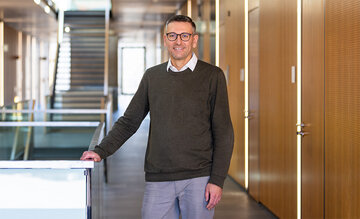Assistance mix through digital networking of advisory and support services
Social space-oriented care concepts (e.g. neighborhood concepts) are based on specific local conditions and aim to achieve the participatory further development of a local social space in the areas of housing, social services, assistance and care. In recent years, they have established themselves as an approach to overcoming demographic challenges.
To date, digital tools have hardly been used to support neighborhood concepts - yet they offer many advantages for promoting social interaction, broad participation and efficient neighborhood management.
In the Rauner neighborhood in Kirchheim unter Teck, the SONIA project used an online platform to create structures that successfully established a community for senior citizens. By linking the virtual space with the real social space, social participation of older people in their immediate environment is supported by making contacts, communicating information and joint activities. Building on these structures, the SONIAnetz project aims to develop new ways of supporting people in need of help, relieving the burden on family carers and enabling social participation.
To this end, the existing platform is to be improved and expanded to include the "care and nursing network" aspect.
Project partners
WirIimQuartier
Online platform to support neighborhood concepts
Social area-oriented care concepts (e.g. neighborhood concepts) are based on specific local conditions and aim to achieve the participatory further development of a local social area in the areas of housing, social services, assistance and care. In recent years, they have established themselves as an approach to overcoming demographic challenges.
To date, digital tools have hardly been used to support neighborhood concepts - yet they offer many advantages for promoting social interaction, broad participation and efficient neighborhood management. As part of the SONIA and SONIANetz projects, the IMTT has worked with users to develop and test an online platform to support neighborhood structures. The platform supplements activities in the social space with online opportunities for communication and social interaction. The platform provides the citizens of the neighborhood with a specific "neighborhood app" that
- offers simple and secure access to selected online services (e.g. video communication, traffic information, etc.) even for older people without a computer or Internet experience, thus promoting participation in the digital world
- enables them to find out about news and offers in the neighborhood
- enables them to communicate with other people in the neighborhood, both within groups (e.g. clubs, neighborhoods, hiking groups) and within the neighborhood as a whole
As a local social network, the platform provides functions for group formation, virtual bulletin boards and the exchange of news in the neighborhood. For the neighborhood management, the platform offers the opportunity to
- Create transparency about existing offers from all stakeholders in the neighborhood
- disseminate information about offers and activities in the neighborhood (events,
- activities, etc.) and thus improve the utilization of offers
- the possibility to communicate efficiently with the citizens of the neighborhood (citizen participation)
In contrast to commercial neighborhood portals on the Internet, the platform offers complete control by local social institutions, which operate the platform themselves and thus avoid the collection of personal data (e.g. for advertising purposes).
Further information can be found here.
CareCircle
Online platform to support mixed-help structures in outpatient care
The majority of people in need of care want to be cared for at home for as long as possible. Although family members feel a strong obligation to contribute to care, they face enormous challenges due to increasing employment and physical distance. In the future, home care will therefore depend to a large extent on a successful care mix, i.e. a combination of informal (family or neighborly) help and professional care. The care mix also includes, for example, transport services, meals on wheels or neighborhood help. Although civic engagement and neighbourly support can also arise on their own, they generally benefit from professional support, e.g. as part of organized neighbourhood assistance. Professional services are also necessary to supplement and stabilize private help.
Up to now, communication and coordination in help networks has often been perceived as a burden. Difficult accessibility by telephone, paperwork, appointment problems and a lack of transparency about the tasks and activities of other players in the support network are often cited as problem areas. The mobile application "CareCircle" supports the cooperation of all those involved in a support network by providing functions for communication and coordination. Professional caregivers, relatives and civically engaged people can use it to:
- gain an overview of those involved in the support network and their rolesShare case-related information with each other via a pinboard
- coordinate processes with individual or all stakeholders in the network via
- create instant messages
- add case-related appointments to your own calendar
The special thing about this is that the platform can also be used to map professional support options and structures of organized neighbourhood help. For example, helpers can easily manage several networks. Questions and inquiries from the network can also be forwarded to a coordination office (or case manager) if required, who can then arrange suitable support services.
Your key contact
I'm happy to provide information about this project

Board member - Care and Technology Lab (IMTT)
Academic Director - Institute for Applied Research (IAF)